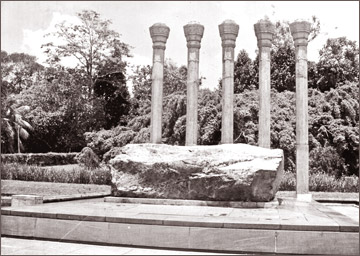Bandaranaike legacy
 In Sri Lanka, September 27 of every year is associated with the
Bandaranaikes, a political family that has been responsible for the
national renaissance in post independent Sri Lanka. The media reported
two ladies offering flowers at the Bandaranaike Samadhi in Horagolla and
they, being the only remaining siblings of the immediate family probably
were symbolizing their gratitude to their famous parents. In Sri Lanka, September 27 of every year is associated with the
Bandaranaikes, a political family that has been responsible for the
national renaissance in post independent Sri Lanka. The media reported
two ladies offering flowers at the Bandaranaike Samadhi in Horagolla and
they, being the only remaining siblings of the immediate family probably
were symbolizing their gratitude to their famous parents.
Mrs Bandaranaike once confessed to my mother that the biggest regret
she had about having to enter politics is that it prevented her from
mothering her family. Mrs Bandaranaike may have been justified in her
grouse but the price she had to pay in terms of her family was well
worth from the national standpoint. There is a nation of Sri Lankans who
look up to Bandaranaikes as the political parents of the modern Sri
Lankan nation. What then, is so special about the Bandaranaike legacy in
Sri Lanka and what are their accomplishments as against the other
political leaders of the country?
Colonial bondage
|

Bandaranaike Samadhi in Horagolla |
Independence after 440 years of colonial bondage is a turning point
in a nationís history and in effect it is the birth of the new Sri
Lankan nation. Therefore the perceptions, aspirations and outlook of
post independent rule has to be in complete contrast to those of the
colonial administration that was interested only in extracting some
commercial benefit from its colony.
Thus there is no way a post independent government could justify its
rule without a thought on the reforms so badly needed in a newly
independent nation. For, to continue in the same vein with no reforms,
would be to perpetrate the same policy of exploitation and structural
command, denying the ordinary man fruits of independence. DS, though a
man of wisdom and talent was not prepared to face the challenges of
nation building and thus he chose, not to upset the apple cart. Thus he
followed the policy of least resistance mainly due to the need to be
practical in the midst of a powerful colonial legacy. DSís main concern
just as that of the British was to keep the Communists at bay.
Mr. Bandaranaike however in his foresight realized that the reforms
would have to come sometime or the other and sooner they came the
better. He opined that a newly independent nation cannot realize its
full potential by being ruled by a handful of persons attuned to
colonial agendas. Since up to that time Ceylon was ruled by the 6.4
percent English speaking minority the nation was raking in only the
talents and capabilities of that minority leaving the balance 93.6
percent of the population practically dormant. That was an inconsistent
stand to be taken by a country that considered its human resources to be
its vanguard in national development.
Social disparities
At the time, newly independent countries in the world were
increasingly embracing communism and socialism. Those doctrines, though
people oriented, had the tendency to hoist totalitarian regimes. This
was mainly because there was a school of thinking at the time that
nation building requires unpopular measures initially and that did not
suit the democratic form of government with elections every five years.
Some rulers in newly independent nations advocated this position more
out of the need to continue in power than for its practical necessity.
With that however the new socialist regimes became sanctuaries for
despots with their petty political theories and personal egos. But
socialism nevertheless was gaining ground in the world over because the
social disparities in most of the newly independent countries were just
the breeding ground for popular discontent.
For instance the situation in Ceylon was that the country was
administered by a 6.4 percent elite with no thought for the aspirations
and social emancipation of its majority. At the time however, in Sri
Lanka we had our own Leftist movement in the form of LSSP, CP and the
Bolshevik Party but for some reason these parties were headed by the
same members of the elite community in Ceylon and hence they lacked
radicalism required for social upheaval.
Foreign policy
The survival of the Left in those days depended, not so much in its
relevance as a doctrine of the average indigenous Ceylonese but rather
on the brilliance of the individuals who led the movement. But
radicalism and social upheaval was very much in the cards and the
Ceylonese society was simmering with social discontent waiting to be
ignited.
It was at such a juncture that the SLFP made its mark in the
political firmament of Ceylon with much needed reforms of emancipation
that gave the average citizen hope and a sense of belonging, wooing him
away from the radical and alien elements. SLFP also initiated a
progressive foreign policy for independent Ceylon ushering its entry
into the UNO.
Thus when radicalism finally emerged in the form of Rohana Wijeweera
and his JVP in the late 1960ís, the masses were well entrenched in the
Bandaranaike policies obviating the need to take this country on a
radical path towards a totalitarian regime. People of Sri Lanka should
therefore be grateful to Bandaranaike policies for saving this country
from totalitarianism preserving its democratic form of government. Hence
the Bandaranaikes belong to the whole grateful nation who reaped
benefits from Bandaranaike policies.
[email protected]
|



